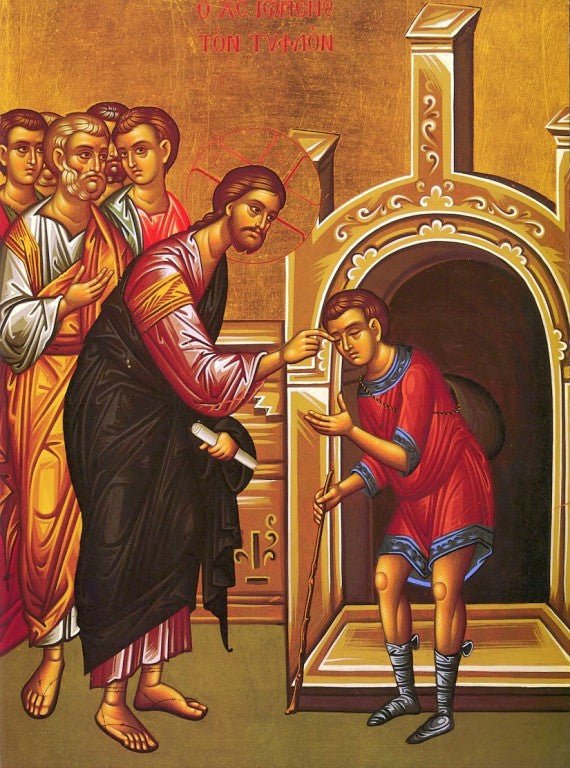Sermon for the 7th Sunday after Pentecost (2015)

In today’s Gospel we read about two of the miracles of our Lord Jesus Christ, worked while He was in Capernaum, a populated city on the banks of the Sea of Galilee where our Savior often stayed and dwelt for periods of time. Capernaum was situated at the junction of important trade routes. Since our Lord spent a significant amount of time there preaching and working miracles, we can assume that the word about His preaching and deeds went out from Capernaum in various directions. Perhaps the two blind men in this Gospel heard from others about the healing power of the God-Man. Imagine the struggle they must have gone through, however, to get to Christ. Not having the privilege of physical sight, they must have required assistance. To go anywhere for them would require labor and determination. But finally they made contact with Christ – as the Gospel says, they followed Him, something which would have been especially difficult for blind men – and cried out to make themselves known: “Son of David, have mercy on us! With this cry they acknowledged two things; first, the royal lineage of the Savior, as it was prophesied that the Messiah would come forth from the House of David, and second their belief in the power of Christ to heal their infirmity. Furthermore, when questioned regarding their faith in the person of Christ, they called Him Lord. Though they were told not to spread the word of their healing, they were not able to restrain themselves for joy. We can imagine that it would have been hard for them to explain to their close ones that they now had sight, without explaining the circumstances concerning their miraculous healing and giving glory to Christ, their Lord and Healer.
Subsequent to this healing of the blind men, our Lord went on to cast a demon out of a possessed man, a demon which rendered the man incapable of speaking. This time, the Pharisees were on site, looking for a way to reproach the Savior, since they, though having physical sight, were spiritually blind. They accused Christ of “casting out demons through the prince of the demons.” Blessed Theophylact, in his commentary on the Gospel of Matthew, calls this statement “the height of stupidity.” Is this not the essence of spiritual blindness? Brothers and sisters, some may have a fear of physical blindness, something which can come from birth, from disease or injury, but do we truly fear spiritual blindness, which is something far more harmful, an impediment that can last unto eternity and affect our eternal fate? We live in an age of spiritual blindness. When modern man speaks constantly of freedom, but never of responsibility, is this not spiritual blindness? What freedom does he speak of, does he protest for? Is it not freedom from God, freedom to trample on his conscience without threat of punishment or accountability? When modern man speaks of tolerance as the highest virtue, but cannot tolerate history or tradition or another man’s conscience, much less the word of God, is this not spiritual blindness? When the “representatives” of modern man, with full access to the attention of millions of other spiritually blind modern men thanks to the phenomenon of mass media, tell us we should be outraged about the potential loss of life due to climate change or terrorist attacks but fully support the continued slaughter of millions of innocent children in the womb, is this not spiritual blindness? When the same “representatives” call everyone on one day to commemorate the victims of past incarnations of fascism, and on the next day tell us we must support several other contemporary forms of fascism which are actually piling up corpses in our time, is this not spiritual blindness?
Spiritual blindness is certainly a thing to be feared. The battle against spiritual blindness, which our Savior alone can rescue us from, begins within each one of us. As monastics we know that spiritual blindness begins with the trusting of our own opinion and confidence in our own thoughts. St. Ignatius Brianchanninov in his ascetical works is very insistent that we should not trust our own thoughts or judgements, but rather we should find a firm foundation in the Holy Scriptures, the works of the Holy Fathers, and in our relationship with a God-fearing spiritual guide. In such a way we hope to be freed, little by little, from our spiritual blindness and healed of this infirmity by the Grace of our Savior. If we are to conquer the spiritual blindness of our time, even in some small way, one person at a time, we must begin with ourselves and pray sincerely to God to free us and heal us, crying out like the blind men in the Gospel, “Son of David, have mercy on us; Lord we believe that Thou canst do this.” Amen.




Leave a comment